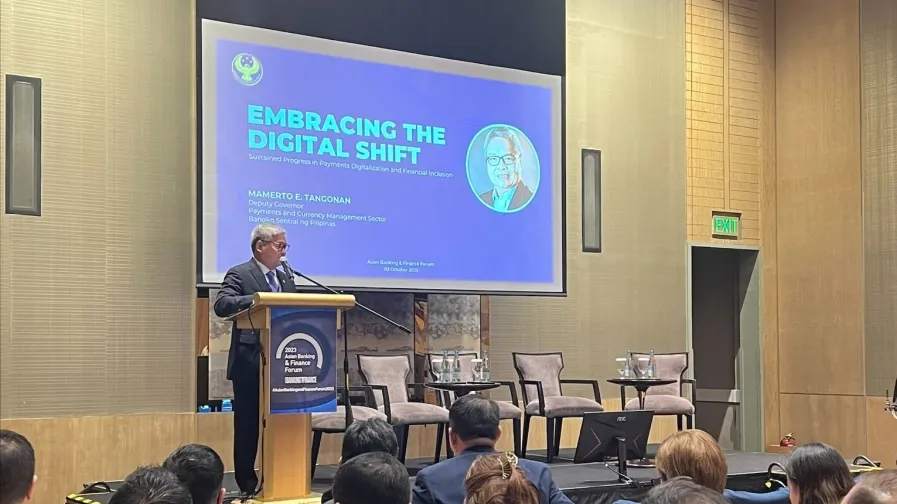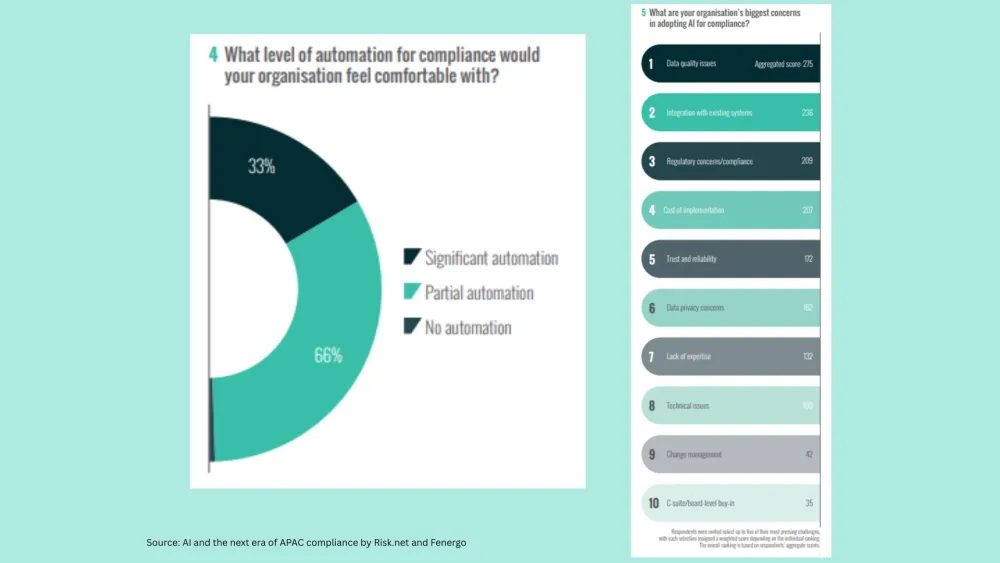
Philippines on track to meet digital payments goal: central bank
Nearly 4 in 10 Filipinos now have e-money accounts, says Deputy Governor Tangonan.
The Philippines is on track to achieve its goal of 50% payments being digital by 2023, according to a senior official of the Bangko Sentral ng Pilipinas.
The share of retail payments value attributed to digital transactions surged to 42.1% in 2022, climbing from just 31.3% in 2021, says Deputy Governor Mamerto Tangonan of the Bangko Sentral ng Pilipinas (BSP), speaking to attendees of the Asian Banking & Finance Forum held at Shangri-La The Fort, Manila.
Tangonan–who heads BSP’s Payments and Currency Management Sector (PCMS)--attributed the rise to the collaborative efforts between the public and private sector.
“Not any single sector could have done this alone,” Tangonan said, citing the collaborative effort between the public and private sector to promote digital payments in the country.
The deputy governor highlighted the role of merchant payments and transmission of business payments– notably salaries and wages– in the digital payments surge.
“This remarkable momentum, driven by the unwavering efforts of our nation's businesses and financial institutions, instills confidence that we are well on track to achieve our wishes forward and the digital payments transformation roadmap–which is to convert 50% of retail payments into digital form by 2023,” Tangonan said.
Shifting preferences
According to the latest BSP financial institution survey, a significant number of account holders use their accounts for payment-related transactions, higher than those who use it for savings.
This was the result of a shift in consumer preferences from savings to payments. “There was a profound shift in consumer behavior towards digital payments, and it's been a strong driving force,” Tangonan said, adding that the number one financial services that most people accept nowadays are payments.
“This was the reversal from the observation in 2018, with a higher number of account holders using their accounts for savings, about 76%, than for payments,” he added.
Setting up the rules
As for BSP, Tangonan noted its role in promoting digital payments by setting up the rules of the game and ensuring open competition between players.
“It's the private sector partners, the financial institutions, that create the products and then deliver them to the customers for their benefit,” he said.
The roll-out of two new digital payment rails– PesoNet and InstaPay– also helped drive digital payment adoption.
Over 600,000 merchants have adopted and are offering the BSP’s QR code payments, QR Ph, from just 30,000 when it was first launched.
BSP also collaborated with the payments industry to launch initiatives that would have the most impact. In a joint study conducted with the Better Than Cash Alliance, for example, the central bank identified five key use cases that in total account for 97% of retail transactions in the country, amongst them supplier payments, merchant payments, and remittances.
E-Money Domination
Tangonan also highlighted the “explosive” growth of e-money accounts or digital wallets in the Philippines. E-money accounts have outnumbered traditional bank accounts since 2021, at about 27.5 million users two years ago. This number is expected to have grown by 2023.
“This signifies a significant step in financial inclusion, with the percentage of Filipinos holding e-money accounts increasing from 8% in 2019 to 36% in 2021,” he noted, saying that e-money accounts are now the most widespread financial choice.
Revolutionizing banking
In the future, the BSP is looking to revolutionize banking and financial services in two particular fronts: cash agents and digital banking.
“Digital banks are widening the reach of financial services throughout the country. There are six digital banks in the country. As of 2023, more than 5 million deposits in digital banks,” Tangonan noted.
BSP is also further pushing for more digital and offline payments across the country.
“Undeniably, there are still parts in our country that are not reached by digital payments. And yet those people also need payment services, hopefully that should be digitized,” Tangonan said. “To further advance digitalization and fully leverage the potential benefits, the BSP–
n close collaboration with the industry--is actively developing new digital payments.
The central bank is also collaborating with the industry to develop new digital payments. Amongst pilots include request-to-pay, where a store or merchant is able to send reminders or requests for payment. The payer, then, will only need to authorize the transaction for the payment to be made.
BSP is also working on a direct debit facility that will enable customers to efficiently manage recurring payments such as rentals during the monetization, insurance premium, and credit card payments. This can be achieved by granting dealers the authorization to automatically deduct funds from the for years to come, Tangonan noted.



















 Advertise
Advertise













